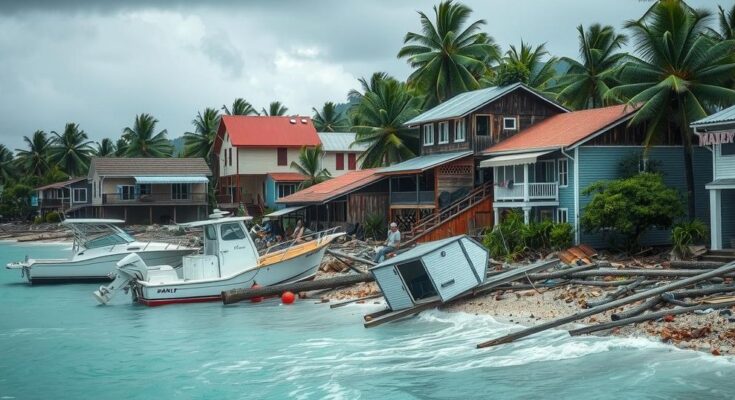Cyclone Chido has hit Mayotte, with officials estimating fatalities could reach several hundred to thousands. The cyclone, the worst to hit in 90 years, brought winds of 226 km/h and severe storm surges, devastating impoverished areas. Rescue efforts are complicated by local customs regarding burial practices, impacting the accuracy of casualty counts.
Authorities in Mayotte, France’s territory in the Indian Ocean, have reported a potentially catastrophic death toll from Cyclone Chido, which struck over the weekend. Initial estimates suggest that the number of fatalities could range from several hundred to possibly a few thousand, marking this cyclone as the most devastating to affect the region in over nine decades. The prefect of Mayotte, François-Xavier Bieuville, indicated that the current official death toll of 14 is likely to rise substantially as rescue efforts continue amidst significant destruction. Winds reaching speeds of 226 km/h (140 mph) and storm surges between 13 and 28 feet have exacerbated the damage, particularly affecting the island’s impoverished neighborhoods. Rescuers from adjacent regions are urgently working to locate survivors, while the cultural practices of the majority Muslim population add complexity to the recovery efforts, as they require burials within 24 hours, impeding the accurate tally of casualties.
Cyclone Chido has severely impacted Mayotte, a territory situated in the Indian Ocean, known for its socio-economic challenges. Home to over 321,000 individuals, the island’s infrastructure and housing primarily consist of informal settlements, which are highly vulnerable to natural disasters. The region has faced considerable strains due to an influx of asylum seekers from Comoros, raising concerns about immigration policies. This cyclone presents a significant humanitarian crisis that compounds existing socio-economic vulnerabilities.
In conclusion, Cyclone Chido poses a major humanitarian challenge for Mayotte, with officials bracing for a significant rise in the death toll from the preliminary figure. Rescue operations are ongoing, amidst widespread destruction in a region already grappling with poverty and immigration issues. The situation underscores the urgent need for comprehensive disaster response strategies in vulnerable territories.
Original Source: www.forbes.com




